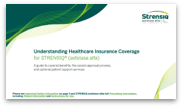Downloadable Resources
Access helpful resources that you can take with you on the go.

Access helpful resources that you can take with you on the go.

Discover information about OneSource™ patient services, including financial assistance, injection training support, frequently asked questions, and more to help you be more prepared for your treatment journey.

Get an overview of the benefits of the OneSource™ Online Experience—an easy-to-use digital support tool.

Read this helpful guide to understanding the insurance process for getting on treatment and learn about important access support options available to patients who have been prescribed STRENSIQ® (asfotase alfa).

STRENSIQ Injection IQ is a booklet with quick tips and tricks for injecting STRENSIQ. Learn about getting ready for your injection, preparing and giving the injection, and Important Safety Information.
Find additional tools and resources that can assist you with staying on top of your condition.
Dive into a collection of children's stories created by Alexion to help you explain living with a rare disease to your loved ones.
STRENSIQ® (asfotase alfa) INDICATION
& IMPORTANT SAFETY INFORMATION
INCLUDING BOXED WARNING
What is the most important information I should know about STRENSIQ® (asfotase alfa)?
STRENSIQ may cause serious side effects, including severe allergic (hypersensitivity) reactions. Allergic reactions are common with STRENSIQ treatment and can be severe and life-threatening. Severe allergic reactions have happened in some people within minutes after receiving STRENSIQ and more than 1 year after starting treatment with STRENSIQ. Stop using STRENSIQ and go to the nearest hospital emergency room right away if you or your loved one get any of the following signs and symptoms of a serious allergic reaction:
What is STRENSIQ?
STRENSIQ is a prescription medicine used to treat people with perinatal, infantile, and juvenile onset hypophosphatasia (HPP).
What are the other possible side effects of STRENSIQ?
STRENSIQ may cause other serious side effects, including:
skin thickening or pits at the injection site (lipodystrophy). Lipodystrophy is common and has happened after several months in people treated with STRENSIQ.
calcium build-up in the eyes and kidneys. People with HPP are at increased risk for developing calcium build-up in the body. Calcium build-up in the eyes and kidneys has happened and is a common side effect of STRENSIQ. Calcium build-up in the eyes and kidneys may also happen in people with HPP who are not treated with STRENSIQ. Your healthcare provider should check your eyes and kidneys before and during treatment with STRENSIQ.
immune-related effects. You may develop antibodies during treatment that may decrease how well STRENSIQ works. Tell your healthcare provider right away if you get worsening symptoms of HPP including: difficulty breathing, difficulty walking, feeling tired, bone pain, stiff joints, or loss of appetite.
The most common side effects of STRENSIQ include local skin injection site reactions such as skin redness, bruising, color change, pain, itching, hardening of the skin (induration), swelling, and bumps. These are not all the possible side effects of STRENSIQ. For more information, ask your healthcare provider or pharmacist. Call your healthcare provider for medical advice about side effects.
You will begin receiving STRENSIQ under the supervision of a healthcare provider. Tell your healthcare provider about all your medical conditions, including if you:
have had an allergic reaction to STRENSIQ.
are pregnant or plan to become pregnant. It is not known if STRENSIQ will harm your unborn baby.
are breastfeeding or plan to breastfeed. It is not known if STRENSIQ passes into your breast milk. Talk to your healthcare provider about the best way to feed your baby if you use STRENSIQ.
Tell your healthcare provider about all the medicines you take, including prescription and over-the-counter medicines, vitamins, and herbal supplements.
There is a registry for people who use STRENSIQ. The purpose of this registry is to collect information about HPP and about what happens when you use STRENSIQ for a long time. For more information about this registry, talk with your healthcare provider or go to www.hppregistry.com
To report SUSPECTED SIDE EFFECTS, contact Alexion Pharmaceuticals, Inc. at 1-844-259-6783 1-844-259-6783 or FDA at 1- 800-FDA-1088 1-800-FDA-1088 or www.fda.gov/medwatch
Please see full Prescribing Information and Patient Information for STRENSIQ (asfotase alfa), including Boxed WARNING regarding severe allergic (hypersensitivity) reactions.
What is the most important information I should know about STRENSIQ® (asfotase alfa)?
STRENSIQ may cause serious side effects, including severe allergic (hypersensitivity) reactions. Allergic reactions are common with STRENSIQ treatment and can be severe and life-threatening. Severe allergic reactions have happened in some people within minutes after receiving STRENSIQ and more than 1 year after starting treatment with STRENSIQ. Stop using STRENSIQ and go to the nearest hospital emergency room right away if you or your loved one get any of the following signs and symptoms of a serious allergic reaction:
What are the other possible side effects of STRENSIQ?
STRENSIQ may cause other serious side effects, including:
skin thickening or pits at the injection site (lipodystrophy). Lipodystrophy is common and has happened after several months in people treated with STRENSIQ.
calcium build-up in the eyes and kidneys. People with HPP are at increased risk for developing calcium build-up in the body. Calcium build-up in the eyes and kidneys has happened and is a common side effect of STRENSIQ. Calcium build-up in the eyes and kidneys may also happen in people with HPP who are not treated with STRENSIQ. Your healthcare provider should check your eyes and kidneys before and during treatment with STRENSIQ.
immune-related effects. You may develop antibodies during treatment that may decrease how well STRENSIQ works. Tell your healthcare provider right away if you get worsening symptoms of HPP including: difficulty breathing, difficulty walking, feeling tired, bone pain, stiff joints, or loss of appetite.
The most common side effects of STRENSIQ include local skin injection site reactions such as skin redness, bruising, color change, pain, itching, hardening of the skin (induration), swelling, and bumps. These are not all the possible side effects of STRENSIQ. For more information, ask your healthcare provider or pharmacist. Call your healthcare provider for medical advice about side effects.
You will begin receiving STRENSIQ under the supervision of a healthcare provider. Tell your healthcare provider about all your medical conditions, including if you:
have had an allergic reaction to STRENSIQ.
are pregnant or plan to become pregnant. It is not known if STRENSIQ will harm your unborn baby.
are breastfeeding or plan to breastfeed. It is not known if STRENSIQ passes into your breast milk. Talk to your healthcare provider about the best way to feed your baby if you use STRENSIQ.
Tell your healthcare provider about all the medicines you take, including prescription and over-the-counter medicines, vitamins, and herbal supplements.
There is a registry for people who use STRENSIQ. The purpose of this registry is to collect information about HPP and about what happens when you use STRENSIQ for a long time. For more information about this registry, talk with your healthcare provider or go to www.hppregistry.com
To report SUSPECTED SIDE EFFECTS, contact Alexion Pharmaceuticals, Inc. at 1-844-259-6783 1-844-259-6783 or FDA at 1- 800-FDA-1088 1-800-FDA-1088 or www.fda.gov/medwatch
INDICATIONWhat is STRENSIQ?
STRENSIQ is a prescription medicine used to treat people with perinatal, infantile, and juvenile onset hypophosphatasia (HPP).
Please see full Prescribing Information and Patient Information for STRENSIQ (asfotase alfa), including Boxed WARNING regarding severe allergic (hypersensitivity) reactions.
INDICATION
What is STRENSIQ?
STRENSIQ is a prescription medicine used to treat people with perinatal, infantile, and juvenile onset hypophosphatasia (HPP).
STRENSIQ® (asfotase alfa) INDICATION
& IMPORTANT SAFETY INFORMATION
INCLUDING BOXED WARNING
What is the most important information I should know about STRENSIQ® (asfotase alfa)?
STRENSIQ may cause serious side effects, including severe allergic (hypersensitivity) reactions. Allergic reactions are common with STRENSIQ treatment and can be severe and life-threatening. Severe allergic reactions have happened in some people within minutes after receiving STRENSIQ and more than 1 year after starting treatment with STRENSIQ. Stop using STRENSIQ and go to the nearest hospital emergency room right away if you or your loved one get any of the following signs and symptoms of a serious allergic reaction:
What are the other possible side effects of STRENSIQ?
STRENSIQ may cause other serious side effects, including:
skin thickening or pits at the injection site (lipodystrophy). Lipodystrophy is common and has happened after several months in people treated with STRENSIQ.
calcium build-up in the eyes and kidneys. People with HPP are at increased risk for developing calcium build-up in the body. Calcium build-up in the eyes and kidneys has happened and is a common side effect of STRENSIQ. Calcium build-up in the eyes and kidneys may also happen in people with HPP who are not treated with STRENSIQ. Your healthcare provider should check your eyes and kidneys before and during treatment with STRENSIQ.
immune-related effects. You may develop antibodies during treatment that may decrease how well STRENSIQ works. Tell your healthcare provider right away if you get worsening symptoms of HPP including: difficulty breathing, difficulty walking, feeling tired, bone pain, stiff joints, or loss of appetite.
The most common side effects of STRENSIQ include local skin injection site reactions such as skin redness, bruising, color change, pain, itching, hardening of the skin (induration), swelling, and bumps. These are not all the possible side effects of STRENSIQ. For more information, ask your healthcare provider or pharmacist. Call your healthcare provider for medical advice about side effects.
You will begin receiving STRENSIQ under the supervision of a healthcare provider. Tell your healthcare provider about all your medical conditions, including if you:
have had an allergic reaction to STRENSIQ.
are pregnant or plan to become pregnant. It is not known if STRENSIQ will harm your unborn baby.
are breastfeeding or plan to breastfeed. It is not known if STRENSIQ passes into your breast milk. Talk to your healthcare provider about the best way to feed your baby if you use STRENSIQ.
Tell your healthcare provider about all the medicines you take, including prescription and over-the-counter medicines, vitamins, and herbal supplements.
There is a registry for people who use STRENSIQ. The purpose of this registry is to collect information about HPP and about what happens when you use STRENSIQ for a long time. For more information about this registry, talk with your healthcare provider or go to www.hppregistry.com
To report SUSPECTED SIDE EFFECTS, contact Alexion Pharmaceuticals, Inc. at 1-844-259-6783 1-844-259-6783 or FDA at 1- 800-FDA-1088 1-800-FDA-1088 or www.fda.gov/medwatch
STRENSIQ® (asfotase alfa) INDICATION
& IMPORTANT SAFETY INFORMATION
INCLUDING BOXED WARNING
What is the most important information I should know about STRENSIQ® (asfotase alfa)?
STRENSIQ may cause serious side effects, including severe allergic (hypersensitivity) reactions. Allergic reactions are common with STRENSIQ treatment and can be severe and life-threatening. Severe allergic reactions have happened in some people within minutes after receiving STRENSIQ and more than 1 year after starting treatment with STRENSIQ. Stop using STRENSIQ and go to the nearest hospital emergency room right away if you or your loved one get any of the following signs and symptoms of a serious allergic reaction:
What is STRENSIQ?
STRENSIQ is a prescription medicine used to treat people with perinatal, infantile, and juvenile onset hypophosphatasia (HPP).